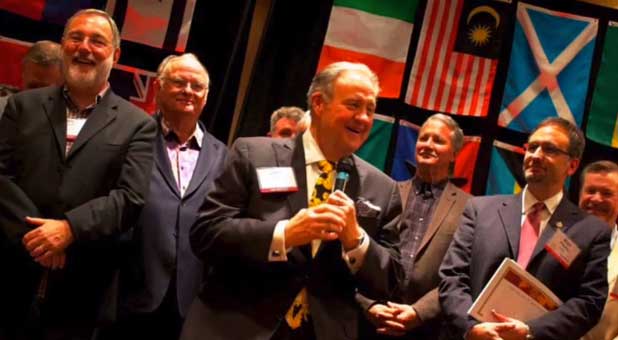US Apostolic Council of Leaders Forms to Advance Kingdom
As the apostolic movement continues making inroads in local churches across America, a new council has formed to pray and strategize about how God can use the combined efforts of apostolic leadership to advance the kingdom in the United States.
Dubbed the United States Coalition of Apostolic Leaders, the new affiliate of the International Coalition of Apostolic Leaders (ICAL) officially launched in June. With the unanimous approval of the International Apostolic Council, John Kelly, leader of the ICAL, named Joseph Mattera the convening leader over the United States.
“The primary objective I have for 2014 is to assemble a national council made up of regional and national apostolic leaders that combine significant influence with godly character that can adequately represent the body of Christ in our nation,” says Mattera, presiding bishop over Christ Covenant Coalition and Overseeing Bishop of Resurrection Church in New York.
“Consequently, approximately 40 leaders met in Atlanta—hosted by council member Bishop Dale Bronner—to hear the vision for our national coalition and to formally become part of the council,” Mattera continues. “This group was a mosaic of seasoned multiethnic apostolic leaders—both charismatic and non-charismatic—of both genders and various vocations in many spheres of society that represent the beautiful diversity of the kingdom of God.”
At the meeting, Mattera presented the name of the national organization, “The United States Coalition of Apostolic Leaders,” or USCAL, as well as the “4 R Vision” which stands for: restore the church to the mission and method of the way of Jesus and the apostles; reconciliation between ethnic leaders and various expressions of the church; revive the church to expand kingdom influence; and reformation of society through Christ-like compassionate service to communities for systemic change that reflect biblical ethics and practice.
“As a fast growing association—we are a fellowship and network of networks, not a denomination or entity that exerts governance over it’s members—that is beginning with more then two hundred ICAL members in the USA, our immediate goal is to conduct conferences and leadership summits across the nation to teach and dialogue regarding this 4 R Vision,” Mattera says.
“We will also emphasize apostolic function and fruit rather then apostolic titles as well as be a voice of concern regarding inordinate entitlement and/or autocratic leadership associated with the name ‘apostolic’ in the past,” he continues. “Our movement will also celebrate the virtues of brokenness, servanthood, and living in simplicity since Jesus taught that ‘the poor in spirit will inherit the kingdom and, the meek will inherit the earth.’ Ultimately, we envision ourselves as a divine conduit to advance kingdom purposes that bless the church and promote flourishing cities and nations.”
The ICAL was conceived in Singapore in 1999 by a group of international apostolic leaders. John Kelly was appointed the leader of the new initiative. After two years, Kelly asked C. Peter Wagner to become the lead convener of the movement. In 2009, on the eve of his 80th birthday, Wagner was directed by the Lord to ask Kelly to again assume the role of Convening Apostolic leader over ICAL. During the past two years, Kelly has focused on launching autonomous apostolic coalitions in every nation affiliated with this movement.
Those who attended included leaders in the church and marketplace such as: Jim Garlow, Doug Stringer, Dennis Peacocke , Robert Stearns, Buddy Crum, Bill Thomas, Luis Vargas, Rod Cesear, Paul Van Valen, Barbara Yoder, Rich Callahan, Bob Englehart, John Benefiel, Ralph Dennis, David Carey, Walt Healy, David Carey, Bart Pierce, Dale Bronner, Jeff Reed, Steve Fedesky Kyle Searcy, Tim Hamon, Sam Roherer, John Kelly, Herb Hutchinson, Eugene Reeves, Hubie Synn, Ron Cottle, Glen Schaefer and Randall Langley. Interested potential council members who could not be present include Barbara Wentroble, Mark Chironna, Lance Wallnau, Michael Brown, H. Daniel Wilson and Ben Paz.














































